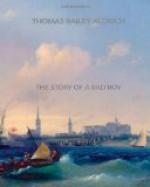One afternoon the four owners of the Dolphin exchanged significant glances when Mr. Grimshaw announced from the desk that there would be no school the following day, he having just received intelligence of the death of his uncle in Boston I was sincerely attached to Mr. Grimshaw, but I am afraid that the death of his uncle did not affect me as it ought to have done.
We were up before sunrise the next morning, in order to take advantage of the flood tide, which waits for no man. Our preparations for the cruise were made the previous evening. In the way of eatables and drinkables, we had stored in the stem of the Dolphin a generous bag of hard-tack (for the chowder), a piece of pork to fry the cunners in, three gigantic apple-pies (bought at Pettingil’s), half a dozen lemons, and a keg of spring-water—the last-named article we slung over the side, to keep it cool, as soon as we got under way. The crockery and the bricks for our camp-stove we placed in the bows, with the groceries, which included sugar, pepper, salt, and a bottle of pickles. Phil Adams contributed to the outfit a small tent of unbleached cotton cloth, under which we intended to take our nooning.
We unshipped the mast, threw in an extra oar, and were ready to embark. I do not believe that Christopher Columbus, when he started on his rather successful voyage of discovery, felt half the responsibility and importance that weighed upon me as I sat on the middle seat of the Dolphin, with my oar resting in the row-lock. I wonder if Christopher Columbus quietly slipped out of the house without letting his estimable family know what he was up to?
Charley Marden, whose father had promised to cane him if he ever stepped foot on sail or rowboat, came down to the wharf in a sour-grape humor, to see us off. Nothing would tempt him to go out on the river in such a crazy clam-shell of a boat. He pretended that he did not expect to behold us alive again, and tried to throw a wet blanket over the expedition.
“Guess you’ll have a squally time of it,” said Charley, casting off the painter. “I’ll drop in at old Newbury’s” (Newbury was the parish undertaker) “and leave word, as I go along!”
“Bosh!” muttered Phil Adams, sticking the boat-hook into the string-piece of the wharf, and sending the Dolphin half a dozen yards towards the current.
How calm and lovely the river was! Not a ripple stirred on the glassy surface, broken only by the sharp cutwater of our tiny craft. The sun, as round and red as an August moon, was by this time peering above the water-line.
The town had drifted behind us, and we were entering among the group of islands. Sometimes we could almost touch with our boat-hook the shelving banks on either side. As we neared the mouth of the harbor a little breeze now and then wrinkled the blue water, shook the spangles from the foliage, and gently lifted the spiral mist-wreaths that still clung along shore. The measured dip of our oars and the drowsy twitterings of the birds seemed to mingle with, rather than break, the enchanted silence that reigned about us.




